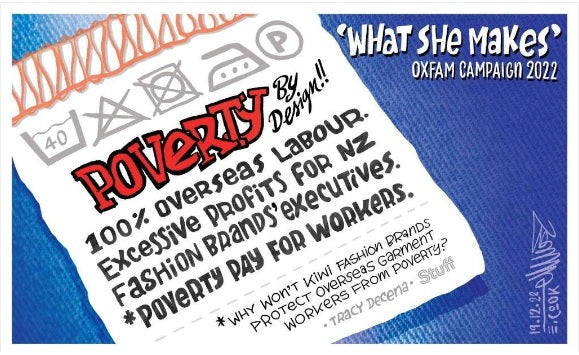
Why won't Kiwi fashion brands protect overseas garment-makers from poverty?
Opinion Piece by Tracey Decena (from Stuff Dec 18 2022)
Click here to read the article in Stuff.co.nz
Why won't Kiwi fashion brands protect overseas garment-makers from poverty?
Tracy Decena 18 December 2022
Tracy Decena leads Oxfam Aotearoa’s What She Makes campaign to make sure fashion brands are fairly paying the women who make their clothes.
OPINION: The fashion industry may be vast and glamorous, but it is built on the backs of millions of women who live in poverty.
Multi-million-dollar fashion brands rake in huge profits yearly, with fashion executives earning $2,500 per hour on average, while the lowest-paid worker in their supply chain gets as little as $0.65 per hour.
When you look at it that way, you can’t deny who has the power and the responsibility to change the lives of the garment workers. It’s the clothing brands.
Brands control price negotiations with the factories. If they don’t think the price is low enough, they could threaten to leave and go with a supplier that offers to make their clothes for much less.
Clothing brands have a say, and can make sure that these women get paid enough not just to survive day-to-day, but to live a decent life.
Of the 75 million garment workers around the world, only 2% earn a living wage.
Clothing brands in New Zealand participate in this systemic exploitation of workers, particularly women, by allowing poverty wages to be paid in their supplier factories. This means that millions of women who make clothes destined for New Zealand stores remain trapped in poverty no matter how hard they work.

Clothing brands here in Aotearoa have a responsibility to ensure workers in their supply chain earn enough to live on: a living wage.
A living wage is the lowest wage paid to a full-time worker, and must cover a basic and dignified standard of living for themselves and their families. A living wage should be earned in a standard working week of no more than 48 hours.
A decent standard of living means a worker can afford nutritious food, clean water, decent housing, education, healthcare, childcare, clothing, and savings for unexpected events. This is the bare minimum. They should not have to choose between a dry safe home and a nutritious meal. They should be able to afford both.
A living wage is a human right.
In my home country, the Philippines, the situation for garment workers is not so different. I have seen my parents make difficult decisions. They have had to choose between paying the rent for the month or giving us, their children, notebooks and pencils for school.
I have seen my mum, just a month after giving birth to my sibling, go back to work because we could not afford to live without her wage. I remember my uncle visiting and telling us that he got fired for joining a union in the factory where he worked, because workers were bargaining for better wages and working conditions.
Labour rights violations and poverty wages are prevalent, especially in low-income countries like the Philippines and Bangladesh. Our economies are at the mercy of foreign investments, and it is the people who work with low wages and in poor conditions, and their families, who suffer the consequences of it.
You might say, “but New Zealand is so small, we barely contribute to this exploitation”. You would be wrong.
New Zealand, along with other countries that fail to get proper legislation in place and ask for fashion companies’ due diligence, contributes to this systemic problem. The clothing retailing industry in New Zealand amounts to $3 billion dollars in revenue, with an annual growth rate of profit at about 7%.
It is not nothing.
That's why I’m determined to change things. I recently met with Glassons, Hallenstein Bros, Kathmandu, Macpac, H&M and Lululemon, and I asked them to pay the women who make their clothes a living wage. You can see what they said at oxfam.org.nz/what-she-makes.
We, as consumers, can make all the difference. When consumers speak, brands listen. With enough of us standing up for the women overseas who make our clothes, I honestly believe we can make a change for good.
Brands in New Zealand can and should change the way they do business.
They must ensure that the people who make the clothes they profit from are being paid enough not just to survive, but thrive.
Opinion Piece by Tracey Decena (from Stuff Dec 18 2022)




















